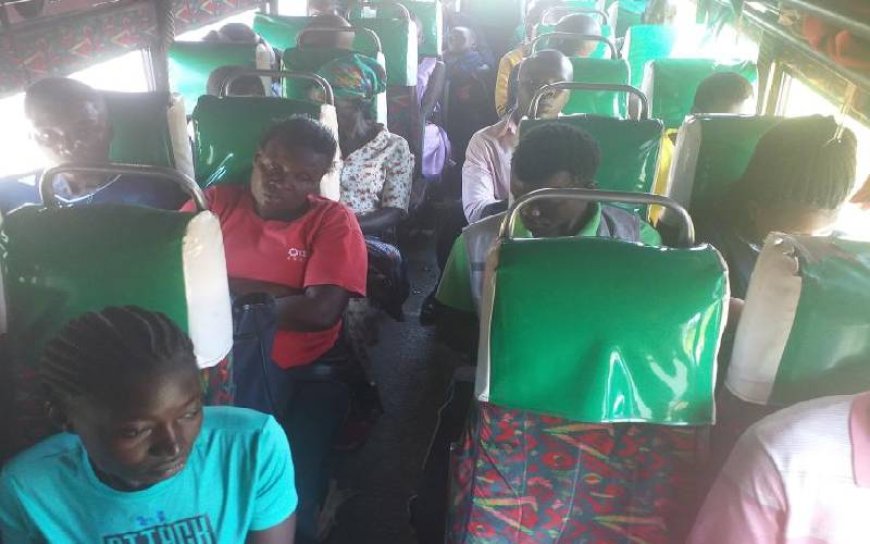Public Service operators moving to Sienta vans to stay ahead of the pack

Nyeri
Thursday 27 July 2023
KNA by Samuel Maina/Hellen Ndirangu
Toyota Sienta mini-multipurpose vehicles (MVPs) are currently giving 14-seater PSV matatus a run for their money in Nyeri as more of the models continue flooding the cutthroat sector whose unspoken law is survival for the fittest.
The vehicles’ flagship name is derived from the Spanish word "siete", which means "seven" (referring to its maximum passenger capacity) and English word "entertain".
The majority of the Sienta cars run on a 1,490-engine capacity (commonly referred to as 1,500 cc) and have a maximum output of 91 PS (engine power) and 120 (Newton meters) Nm of torque.
On consumption on a regular commute, the car can cover an entire 1,081 kilometers stretch on a 40 -litre full tank. On average, the car has been found to consume 3.5 liters of fuel for every 100-kilometer, making it an ideal car for short those whose watchword is economy.
Prices of locally used Sienta cars in Kenya range from as low as Sh 1 million to Sh 3 million for the newest models. Now public service operators are going for taxis with two pick-up and drop-off points entirely dedicated to their use within Nyeri town.
However, despite the recommended passenger capacity of seven, operators have devised ingenious ways of ensuring that they squeeze three more passengers in order to maximize profit.
Fortunately, lovers of taxis rarely complain and have come to accept the added inconvenience as long as they arrive at their destination in one piece. In fact, the majority of the commuters KNA spoke to disclosed they prefer the vans compared to the traditional 14-seater- matatus.
They said that unlike other towns, where commuters have the option of jumping into a tuktuk, the situation here is quite different since the three-seater tricycles are yet to find their footing.
Similarly, the preference for the cabs has been born from the belief that they are faster, cheaper and quite accessible.
A Sienta taxi operator Mr. John Kamau admits that those who commute within Nyeri town and the surrounding areas prefer the cars since they are convenient and also time saving when compared with matatus.
“One advantage of these vehicles is derived from the fact that they can access remote areas like Skuta, Ruring’u and Kiamwathi where matatus are reluctant to go. Our cars also carry less passengers when you compare them with the common matatus meaning less time before we fill up,” he narrated to us.
Another operator, Mr.Benson Otiende stated that with the harsh economic times, the taxis have become common since they are cheaper when one compares them with matatus or boda-boda motorcycles.
Otiende says the charges are however rated according to one’s destination but rarely exceed sh 50 for a one-way trip. And in case one is not in a position to pay the full fare, there is always room for a little haggling, though this is rarely the norm.
“Our taxis cover a short distance within Nyeri town, so our prices are usually as low as Sh 40 depending on the distance whereas matatus and motorcycles charge from up to Sh 100 for the same distance,” said Otiende.
“Sometimes we also ferry our frequent customers on credit when times are hard on them and later receive our full payment when they get something. It’s a delicate balance but that is how we do to avoid a situation where we end up losing our very loyal passengers,” he adds.
But with the biting financial crunch currently being experienced in the country, Otiende says the number of trips he used to make on a daily basis have drastically reduced as more and more of their clients have decided to be trekking to and fro their workplaces.
While empathizing with the situation, he nevertheless says there is little they can do but wait until such a time when the situation will somehow improve.
The situation has also been aggravated by the entry of app-hailing cabs such as Fikisha and Bolt that are now invading their territory and even charging customers friendlier fares.
Still, bodaboda riders also lie in wait for any available opportunity in order to grab the undecided passenger who does not mind paying more to reach home as long as his safety is guaranteed.
“During the peak days, we could make at least three to four trips a day which is a far cry from what we are witnessing today. Nowadays making two trips is never guaranteed and this is being complicated by the entry of online taxi companies such as Fikisha and Bolt who are willing to lower charges to accommodate the local clients. This means we have to charge lower fares to ward off such competitors if we have any hope of staying longer in this business,” he further explained.
A resident of Kiamwathi village Mr Anderson Karimi who frequently uses the Sienta taxis is all praise about the cars insisting they are far above the rest in terms of service delivery.
He says that when compared with other modes of public transport, one is assured of being dropped at his designated destination without having to argue with unruly drivers and their conductors.
“These vehicles have actually revolutionized the local transport sector by ensuring the commuters are safely dropped at their places of choice. This reduces the distance one is supposed to walk to his destination,” he says.
Courtesy ; K. N. A
What's Your Reaction?
































































































































































































































































































